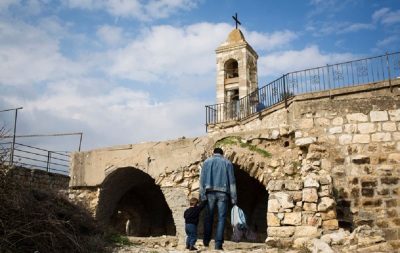Palestinian Christians Plea to Israel to Let Them Return Home

After 65 years in exile, Palestinian Christians are asking the Israeli government to finally keep their promise, and allow them to return to the home of their ancestors.
Forced from Biram in 1948 by Israeli forces during the creation of the state of Israel, Maronite Christians were guaranteed a return to their village in a 1951 Supreme Court case. But the Israeli government has never made good on this promise, despite pleas from the Biram diaspora.
Now, descendents of the community have sought to make their case to the government through an encampment in the national park where the town is located.
Palestinian citizen of Israeli and activist George Ghantous says that even though he's never lived in Biram, he still identifies it as his homeland.
"We always wanted to come back," the 31-year-old told Al-Jazeera. "We grew up with a feeling of not belonging to one place, we have the desire to return."
Should the Israeli government allow a return to Biram, one of the first steps that activists would have to contend with would be the lack of infrastructure. Except for one church, Biram's homes were blown up by Israeli forces in the early 50's.
The church though, has remained central to many Palestinian Christians' identity. In order to draw members of the community that now live spread out across northern Israel, services are held on Saturday, the second day of Israel's official weekend.
Father Afif Makhoul, head of Biram's church, hopes to bring the original community back together.
"It's not my role to ask people to return as a political statement. But as priest of Biram, I believe the parishioners should come back to their church," he told Al Jazeera.
Israeli police have informed protesters that they are trespassing on state land and have warned them to leave, though there has been no official crackdown.
Biram protesters are hopeful that their actions will be a successful model to others looking to return home to their own villages.
"Most important is that it's a prototype for other villagers to do the same. We want this to be a phenomenon," said Ghantos.
Biram is not the only city that has seen protests. About a dozen protesters have also been living outside the Palestinian Greek Catholic village of Ikirt, with hopes of the same result.
Many Palestinian villages, both Christian and Muslim, were destroyed by the military in the creation of Israel. But unlike the Palestinian Muslim population, Israelis were eager to maintain good relations with Christians and gave them the option of staying in Lebanon (where most had fled to) or live in Israel, said Benny Morris, an Israeli historian.
Despite promises that they could resettle their villages, the Israeli army feared that allowing Christians to return would be an "endorsement of the refugees' claims to the lands" and "undermine the existence" of Jewish settlements built there.
Both the populations of Ikrit and Biram live throughout Israel and regularly volunteer for the Israeli military. Many had also served alongside the military in campaigns against members of the Palestinian Liberation Organization.
Because of these ties, some Israelis have spoken up against what they see as a lack of justice in the situation.
"How to explain this treatment of loyal allies by the State of Israel? Is this a deliberate policy of the Israeli government toward its Christian friends? Is this likely to encourage others to tie their fate to Israel?" wrote columnist Moshe Arens in the Israeli newspaper Haaretz.
The 20th and 21st centuries have been a traumatic era for Middle Eastern Christians. Originally making up 20 percent of the population, they now make up just five percent, many of them having fled the region due to violence and persecution.





























